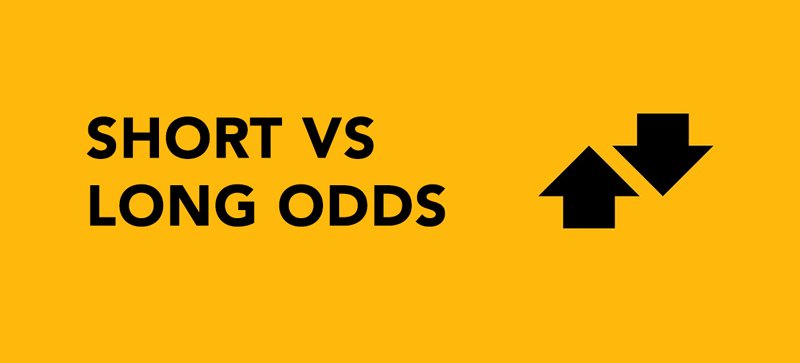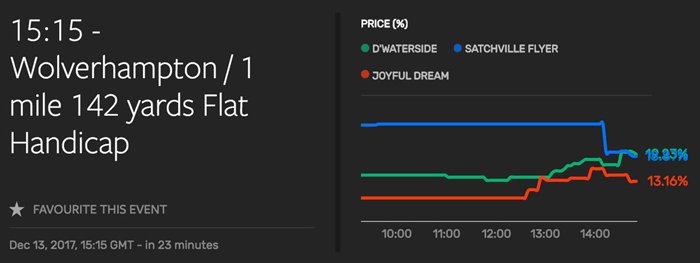Short and long odds might be new betting terms to any beginners out there. But it’s important to understand what they mean and the difference between the two.
That’s why I created this article. To help you understand and get to grips with short and long odds to help you with your betting strategy.
Whilst you may not come across these terms on a daily basis, it’s still good to know exactly what they mean so you’re not confused when they do pop up.
So, what do short and long odds mean?
Short and long odds meaning
Short and long odds are terms used to describe the probability of an outcome.
- Short odds refer to outcomes that are likely to happen.
- Long odds refer to outcomes that are more unlikely to happen.
For example, you might say that Arsenal have short odds to beat Notts Forest in a Premier League game or that England have long odds to beat India in a T20 cricket game.

These terms are interchangeable with odds on and odds against. So in our example above, Arsenal would be odds on favourites to beat Notts Forest and England would be odds against to beat India.
Short odds meaning
Short odds are generally classed as evens or smaller. Less than 2.00 (decimal format) or 1/1 (fractional format).
However, what is classed as short depends on the market you’re betting on. For example, short odds on a horse racing market will be much higher than that of a football market due to the number of runners etc.
Long odds meaning
Long odds could be anything from 5.00 (4/1). If a team has long odds, they have a poor chance of winning the event.
Short or long – which is better?
Now you know more about short and long odds, which is better? This is very subjective and it totally depends on your betting strategy and how much risk you want to take.
Benefits of betting on short odds
Short odds by their nature consist of likely outcomes which don’t typically provide a great profit margin for punters. You’re not going to win large amounts from each bet but the key is in the volume.
Bettors who use short odds will win far more bets than those who bet long.
Mathematically speaking, placing a bet at 1.50 gives you a 66% chance of winning your bet. As you move towards 2.00, your chances get nearer 50/50. Beyond 2.00, the odds are stacked well in the bookie’s favour.
If you’re looking to profit on a regular basis, it’s probably best to bet using short odds. However, you will need to place a lot of bets.
There are various betting tipsters out there who only bet on short odds.
What about long odds?
So how about using long odds?
On the other hand, long odds are more profitable but they carry far more risk. You’re more unlikely to land bets with long odds meaning you need to win big when you do. At odds of 8/1, you need to win one in 8 bets just to break even.
The bookmakers know the likelihood of landing these bets is quite low which is why they offer more value to entice punters to place bets on long odds.
This is where research comes into your betting strategy. If you want to make a profit, it’s vital you know exactly what you’re betting on and why. This way, you’re more likely to win your bets regardless of whether they’re short or long.
If you don’t have time or would rather someone else do the research for you, I recommend you check out our top betting tipsters.
Odds movement
Bookmaker’s don’t set the odds for a market and leave them, they’re always moving up and down in value. In the run up to an event, the bookmaker’s odds will fluctuate based on market sentiment and up to date information.
When odds reduce in value they are shortening and when they increase in value they are lengthening. To get the most value out of your bets you need to stay up to date with the latest news and information.
At certain betting sites like Smarkets you can see the history of a market and how the odds have fluctuated over time. This can help punters predict future market movements and maximise their value from their bets.

Finding the best value
As with anything in the betting industry, it’s important to do your research before placing any bets. There are hundreds of bookmakers which all offer slightly different prices on certain markets.
The aim is to find the best value bets to maximise your potential return. This is a process called line shopping and it’s used by all serious punters.
There are various sites you can use to help you find the best odds. We’re not affiliated with any sites but I recommend you use either Oddschecker or Oddsportal.
Conclusion
Overall, short and long odds are pretty self-explanatory.
You’ll come across short and long odds on a regular basis and now you know what the terms mean.
Whether you want to bet on short or long odds is totally up to you and the betting strategy you choose to implement.
